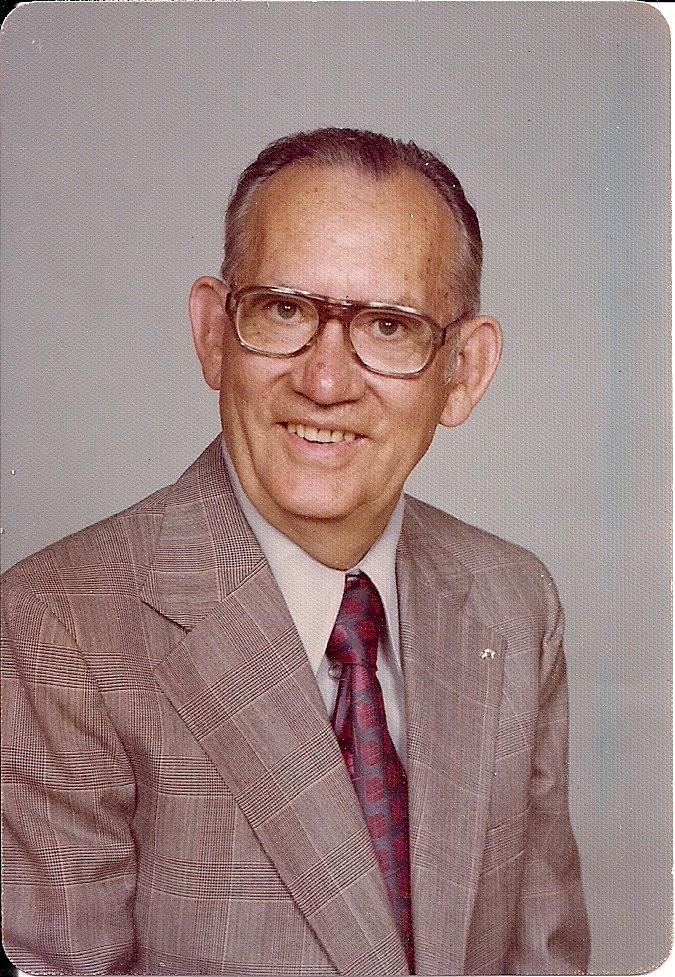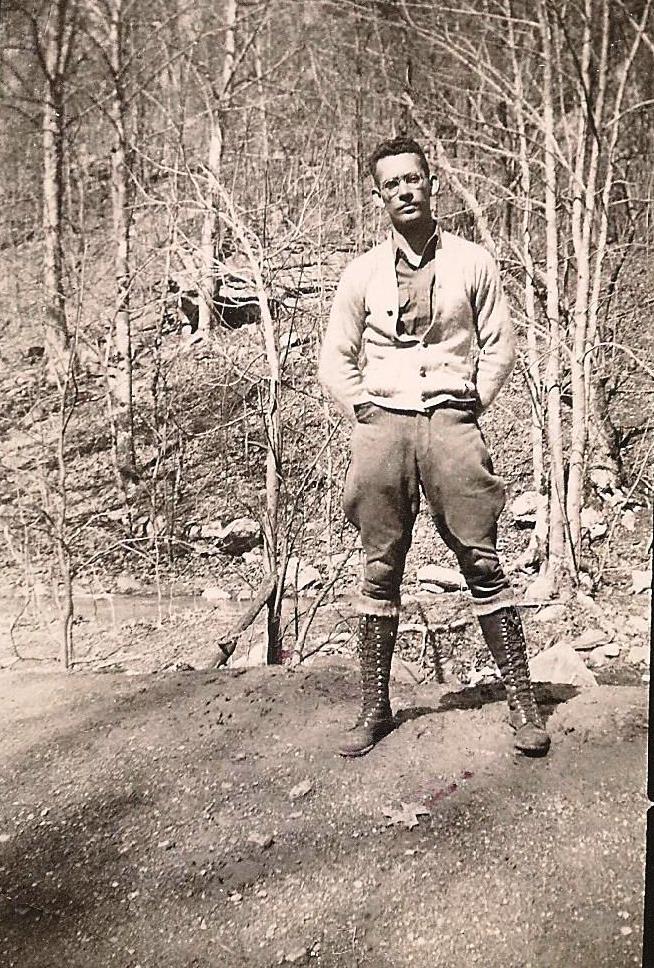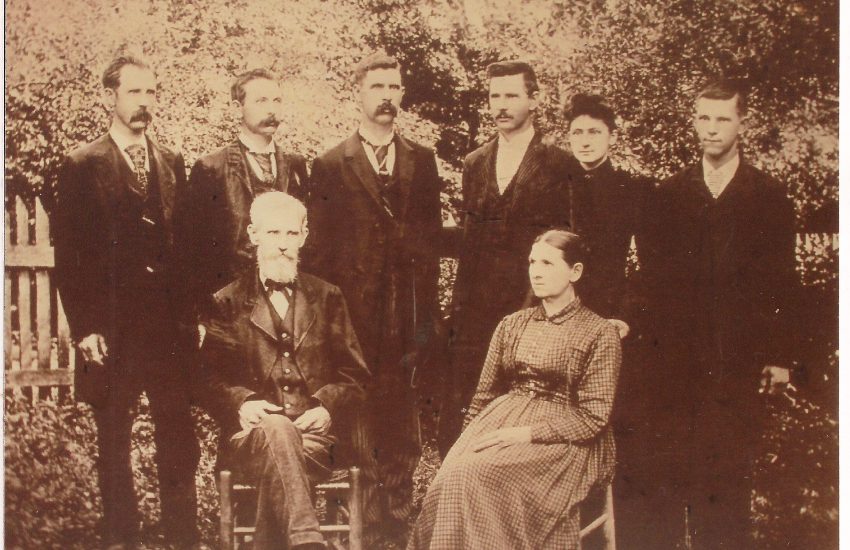Remembering Woodrow Denton

Johnnie (Denton) Freedle of Portland, TN, daughter of the late Thomas Woodrow Denton and wife Christine Maynord Denton, former residents of Overton County, shared the following information from a type of journal her father complied. Before we read about life in the 1920s and 30s as described by Mr. Denton, here is some background information about him.
Following graduation from Livingston Academy in 1932, Woodrow Denton was persuaded by his older sister, Velma, to enroll in Tennessee Tech. Many will remember Velma Denton Watkins who taught school for many years in the Overton County school system. After attending only three months, Woodrow was able to receive a four-year certificate to teach school and began his teaching career in a one room/one teacher school in Johnson Hollar. This school was located at the head of Copeland Cove, some three miles from Woodrow’s home. The sun rose on the schoolhouse at about ten o’clock in the morning and set around four in the afternoon. Woodrow taught two eight-month terms, and recalled with fond memories the time he spent teaching there, describing the students as having taught him much more than he taught them. Livingston Grammar School’s eighth grade class in 1947 was the last class he taught. With his pay of $50 per month, he was soon able to purchase 2 acres of land just off the Hilham Road in Livingston where he built a home for the family after the death of his father. The following is taken from one of his journal entries:
“I wish everyone could have spent their early life in the Upper Cumberlands which consists of about twenty counties in Kentucky and Tennessee. This area is drained by the Cumberland River which rises near Harland, Kentucky from the meeting of three creeks called Poor Fork, Clover Fork, and Martin’s Fork. From Burnside, Ky to Carthage, Tn, the river is as crooked as a dog’s hind leg, thus making the river traffic slow. Since this area was cut off from the outside world due to the nature of the river and lack of roads made coming and going mighty nigh impossible. The Cumberland River was joined at Celina, Tn in Clay County by the Obed River which rose in the Tennessee counties. The East fork and the West fork of this river help cause flooding every few years. I have seen water almost cover homes several time in Celina. In 1939 and 1940, the U.S. Engineers places dams to cure the flooding. The first one was at Jamestown, Ky and the other at Celina, Tn. Due to the nature of the river and the Upper Cumberland, people who came there became comers and stayers. Most were English, Scotch, Irish and German. They brought their customs, beliefs, superstitions with them. They adapted to this new way of life because of their freedom and resourcefulness. It is still said that the women of Upper Cumberlands made the best wives ever because they had always seen worse or had less.
“It was not until World War II that change came into the hills and hollers. Every family was turned upside down and many young men went to war. What the people of the outside world noticed first was the dialect or folk speech and it has been made fun of, imitated, copied and mocked since the outsiders discovered them. What they didn’t appreciate or discover was that the people spoke almost pure Elizabethan English mixed with a touch of German and Scotch Irish. Of course there were adaptations, it was full of color and slang. There was never a lack for an expression or word to convey the exact meaning. That is where Minnie Pearl got the word of greeting, “Howdy!” Other words much used were:
“Play purties for toys;
Hacked for embarrassed;
Puny for not feeling well;
Poke for sack or bag;
Tote for carry;
Fetch for bring it here;
Backerds for backwards;
Black Guard for vulgar talking;
Blue John for skimmed milk;
Tuberous for suspicious or doubtful;
Woods Colt for illegimate child.
“The younguns were told lots of things just for fun. If they were greedy, they would be turned into a red headed peckerwood and fly up the chimney. If they played with toad frogs, they would have warts. If they killed a toad frog, it would make the cow give bloody milk. If they sucked their thumb, it would make them pot-bellied. If they ate creasy sallet, it would make their hair curly and their eyes blue. If their back itched, it meant they would get a whipping. If they had a blister on the tongue, that meant they had told a lie. Grown-ups weren’t joking when they told them if they “showed out” when they went to church, they would get whipped until their hides wouldn’t hold shucks.
“In the Upper Cumberlands, a boy could never become a man unless he had done most of the following things:
Get a whipping at home after getting one at school.
Tear down a little girl’s playhouse;
Make a mud pie;
Put a coal of fire on a Terrapin’s back;
Roll a smoke of rabbit tobacco in a brown paper poke;
Make a Crow’s foot or Jacob’s ladder with a string;
Get a stone bruise on the heel or stump a toe;
Wear an asafetida bag to prevent disease;
Get tired of eating ham and red eye gravy;
Suck an egg;
Play Antne over;
Get a speck out of an eye with a flax seed;
Ride a coupling pole;
Fill up a straw tick;
Pick a goose;
Walk a foot log;
Break a possum’s back trying to break its neck;
Pull fodder;
Clean hog guts;
Go to a pea shelling;
Dig May Apple;
Swing on a grapevine;
Pour hot water onto the walls and bed springs to kill chinches;
Sleep in a shock of corn;
Tie a string to a June Bug’s leg;
Eaves drop on your neighbor on the old telephone;
Burn a brush pile at night and catch the woods on fire;
Stand in the corner at school;
Hole up cabbage;
Grind coffee;
Pick Whippoorwill peas;
Make a pack saddle;
Gee whiz a new ground;
See someone making moonshine;
Trick a buddy into a hornet’s nest;
Slop the hogs;
Roll a wagon wheel with a stiff wire click;
Have the itch;
Eat at a second or third tale;
Carry a turn to the mill;
See a coat sleeve slicked over from a runny nose;
Make a necklace from chinquapins or acorns;
Take a bath in a galvanized tub;
Wear long handles to school;
Have a cob fight;
Dig a grave;
Go on a hay ride;
Wear britches with patches on top of another patch;
See a stick and clay chimney;
Take a dose of Back Draught;
Get stung by a pack saddle;
Let your dog lick a sore;
Tie a horsehair around a wart;
Drink wormseed tea for stomach worms;
Make Sassafras tea for a spring tonic;
Drink mare’s milk for whooping cough;
Scrape a hog;
Fight over a cabbage stalk in kraut;
Eat Leather Breeches beans;
See a joint snake;
Make a broom from broomcorn;
Blow in a baby’s mouth to cure thrush;
Let Grandpa set your broken arm;
Grow kaffercorn for chickens;
Douse a setting hen in a barrel of water;
Make a balloon from a hog’s bladder;
Eat a green persimmon;
Get scared of foxfire in the woods at night;
Want to throw up your socks from being sick;
Water witch for a well before digging;
Pick goose berries;
Chew slippery elm bark;
Go snipe hunting;
Salt down meat in a box;
Wash britches with a battlin stock;
Trade for a mule over seven years old (not any);
Go to the CCC Camps;
Work for the WPA;
Drink out of a mud hole;
Break an arm by cracking a car;
Get a whipping with a black locust limb;
Go to the spring after water;
Buy groceries from a rolling store;
Buy something that wasn’t worth a bucket of spit;
Get so mad you could eat fried chicken.”

Thomas Woodrow Denton finished his education at Tennessee Tech in 1940 and received his Masters in 1952 from George Peabody College, now part of Vanderbilt. In addition to teaching school in Overton County, he was employed by the US Corps of Engineers during their land acquisition for the building of Dale Hollow dam. He was drafted and began serving in the military in 1941. Following his employment with R.J. Long and the 7Up Bottling Company business, and he owned and operated a hardware store in Portland, TN up until a few months before he died in November of 1998. The city of Portland honored his with a “Woody Denton Day” in the early part of November, but due to his declining health, he was unable to attend. The Dentons used high school co-op students from the vocational school to work in their hardware store. It was their goal that these students have the opportunity to learn about the business world and to see first hand what all is involved in the running of a small business. At Christine’s funeral in October of 2014, the co-op boys were her pallbearers.

